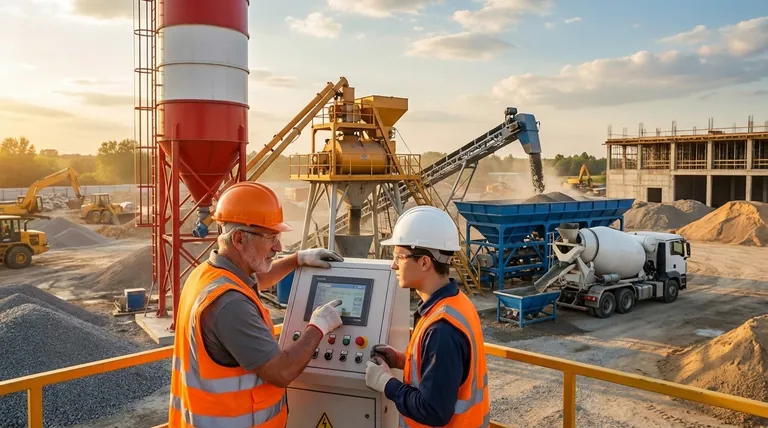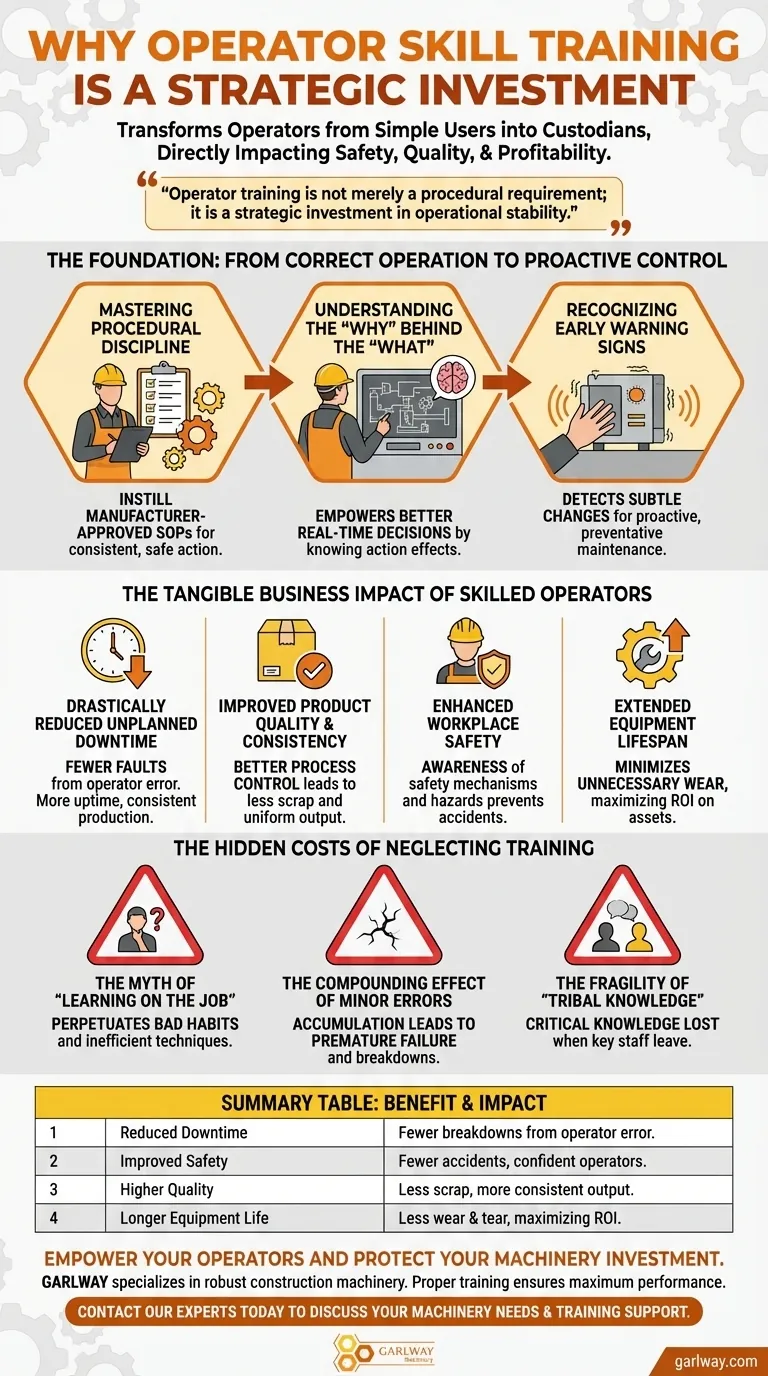The fundamental reason for operator skill training is to ensure they master the proper methods and techniques for the equipment they control. This core competency is the first line of defense against operational faults, equipment damage, and production downtime caused by incorrect handling.
Operator training is not merely a procedural requirement; it is a strategic investment in operational stability. It transforms an operator from a simple user into a custodian of the equipment, directly impacting safety, quality, and profitability.

The Foundation: From Correct Operation to Proactive Control
Effective training goes far beyond showing someone which buttons to press. It builds a deep, functional understanding of the machinery and its role in the larger process.
Mastering Procedural Discipline
The primary goal is to instill the correct, manufacturer-approved standard operating procedures (SOPs). This ensures every action, from startup to shutdown, is performed consistently and safely.
Without this foundation, operators may develop incorrect habits that seem harmless but introduce stress on the equipment over time.
Understanding the "Why" Behind the "What"
True skill develops when operators understand why procedures exist. Knowing how a specific action affects internal mechanics or the final product empowers them to make better real-time decisions.
This context turns a reactive task-follower into a proactive problem-solver.
Recognizing Early Warning Signs
A well-trained operator is attuned to the machine's normal state. They can detect subtle changes in sound, vibration, or output that signal a developing problem long before it triggers a formal alarm.
This early detection is critical for shifting from costly reactive repairs to planned, preventative maintenance.
The Tangible Business Impact of Skilled Operators
Investing in operator skills yields clear, measurable returns across the entire operation. It is one of the highest-leverage activities a company can undertake to improve performance.
Drastically Reduced Unplanned Downtime
The most immediate impact is a reduction in faults caused by operator error. Skilled operators run equipment within its designated parameters, avoiding overloads and improper use that lead to breakdowns.
Fewer errors mean more uptime and more consistent production output.
Improved Product Quality and Consistency
Operators who understand the process can better control variables that affect quality. This leads to less scrap, less rework, and a more uniform final product, directly protecting revenue and brand reputation.
Enhanced Workplace Safety
Incorrect equipment operation is a leading cause of workplace accidents. Formal training ensures operators are aware of all safety mechanisms, emergency protocols, and potential hazards associated with the machinery.
A safe operator is a productive and confident operator.
Extended Equipment Lifespan
Proper, consistent operation minimizes unnecessary wear and tear on mechanical and electrical components. This extends the functional life of expensive capital assets, maximizing the return on investment.
The Hidden Costs of Neglecting Training
Choosing to forgo or shorten formal training creates significant, often unmeasured, liabilities that manifest throughout the operation.
The Myth of "Learning on the Job"
While experience is valuable, unstructured on-the-job learning often perpetuates bad habits. An experienced but improperly trained operator can unknowingly pass down inefficient or unsafe techniques to new hires.
This creates a cycle of systemic underperformance that is difficult to break.
The Compounding Effect of Minor Errors
Small, seemingly insignificant operational mistakes rarely happen in isolation. Over hundreds or thousands of cycles, these minor deviations accumulate, leading to premature component failure, quality drift, and eventual breakdowns.
The Fragility of "Tribal Knowledge"
Without a formal training program, critical operational knowledge often resides with a few key senior operators. If these individuals leave, their undocumented expertise leaves with them, creating a major knowledge gap and operational risk.
How to Apply This to Your Operation
A structured training program is the mechanism to turn operators into assets. Your specific focus will determine the emphasis of the training.
- If your primary focus is maximizing uptime: The training must heavily emphasize preventative checks, proper startup/shutdown sequences, and recognizing early fault indicators.
- If your primary focus is improving product quality: The program should concentrate on process control, how operator actions influence output parameters, and consistent material handling.
- If your primary focus is enhancing safety: Training must be built around a deep understanding of all safety guards, lockout/tagout procedures, and emergency response protocols.
Ultimately, investing in skill training empowers your operators to become the first and most effective line of defense for your entire production system.
Summary Table:
| Benefit of Training | Impact on Your Operation |
|---|---|
| Reduced Downtime | Fewer breakdowns from operator error |
| Improved Safety | Fewer accidents and confident operators |
| Higher Quality | Less scrap, more consistent output |
| Longer Equipment Life | Less wear and tear, maximizing ROI |
Empower your operators and protect your machinery investment. GARLWAY specializes in providing robust construction machinery, including winches, concrete mixers, and batching plants, for contractors and construction companies worldwide. Proper operator training ensures you get the maximum performance and lifespan from your equipment. Contact our experts today to discuss your machinery needs and how we can support your operational success.
Visual Guide

Related Products
- HZS25 Best Cement Mixer for Quick Mix Concrete at Bunnings
- Portable Cement Mixer with Lift Concrete Machine
- Commercial Electric Concrete Mixer Machine HZS 50 Small Batch Plant for Sale
- Shaft Mixer Machine for Cement and Regular Concrete Mixing
- Portable Ready Mix Concrete Mixer Equipment
People Also Ask
- What factors should be considered when selecting a trailer winch? A Guide to Safe & Efficient Loading
- What should be considered when mounting a winch on a trailer? Ensure a Safe, Aligned Installation
- What environmental risks affect a windlass on the forecastle deck? Protect Against Waves & Corrosion
- What are the benefits of combination winches? Get Ultimate Strength and Flexibility
- Why are hydraulic towing winches considered versatile? Unmatched Power and Reliability for Demanding Jobs
- What are deep profile winches best suited for? Unmatched Power for Heavy-Duty Industrial Lifting
- What is the role of a pile foundation in transferring loads? Ensuring Stability in Weak Soil Conditions
- What is a hydraulic winch? The Ultimate Guide to Continuous Heavy-Duty Pulling Power



















